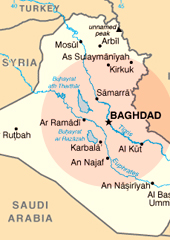Coming to Grips with the Iraq War’s Refugees
What is perhaps the most overlooked consequence of the Iraq war — and what can be done about it?
May 3, 2007

There are approximately four million Iraqis who have been forced to flee their homes as a result of the ongoing violence in Iraq — and almost half of them are living in Syria and Jordan.
Nowhere is the lack of a U.S.-led regional strategy for managing the fallout from the Iraq war more apparent than in the plight of these displaced people, whose numbers are growing by as many as 50,000 a month.
According to relief agencies, the displaced Iraqis are in dire need of housing, medical care and education. Partially due to the large influx of Iraqis seeking shelter in Amman, for example, housing prices have skyrocketed, and inflation is up by 8%. Iraqi families have been forced to move in together and spend all their savings on rent.
Their medical needs in Jordan and Syria are going largely unmet because demand is far outpacing the supply for publicly provided care, while private services are insufficient and costly. On the education front, many of the nearly one million Iraqi children in both countries are not in school, but rather sitting at home with nothing to do.
While the displaced Iraqis feel disenfranchised and discriminated against, the host countries' populations feel taken for granted and resentful of the burden they have been made to carry as a result of the Iraqi presence on their soil.
Part of the reason for this sentiment is that the displaced Iraqis are settling in the poorer communities of the host countries that are already suffering from inadequate infrastructure, education, health and social services.
The Iraqis are, in short, overtaxing already overburdened systems. Even before the large influx of Iraqis into Jordan, for example, its public school system was ao overburdened that many schools operated in two shifts.
To quell the sense of frustration and anger that is developing in the region and could foster increased terrorist activity, the Bush Administration should take the lead in working with the United Nations to develop a coordinated strategy with Syria, Egypt, Iran, Jordan, Lebanon and Israel on what to do with the displaced Iraqis until they can return home.
Donor countries can relieve some of the pressure by looking for ways to help the Iraqis that also help the impoverished local communities into which they have moved. Working with local governments to build new schools can, for example, promote win-win situations for both the Iraqis and their hosts.
In addition, the United States must set an example for other Western countries by taking in more Iraqis and providing the lion's share of the funding for the United Nations High Commissioner for Refugees’ (UNHCR) response to the crisis.
Jordan has already closed its border to any more Iraqis — and it is unclear how many more Syria can accommodate. Lebanon and Egypt, who together are hosting approximately 150,000 Iraqis, have already made it clear they do not want more.
Since the U.S. invasion of Iraq in 2003, the United States has only taken in 466 Iraqis, and UNHCR has only resettled 1,500. This is in part because UNHCR is woefully under-funded — and in part because Western countries have not demonstrated any interest in resettling Iraqis.
I remember at the end of the Vietnam War, when 135,000 Vietnamese refugees fled to the United States. My parents took in a family of five, under a State Department-run program, whereby U.S. families would sponsor a refugee family for a year or so until the parents had found work and a place to live.
The United States should consider developing a similar program for Iraqis whose lives are now in danger for having worked for the U.S. government in Iraq. There is even a role for Israel to play in this regard, for there are some 20,000 Palestinians still in Iraq who might find a home in the West Bank if Israel would allow it. The Jordanians and Syrians don't want them — and they cannot stay in Iraq.
The Iraqi police and Shia militias have singled them out for retribution and deportation because they are predominantly Sunni and perceived as having enjoyed favored status during Saddam Hussein's rule.
The international conference on Iraqi refugees that U.S. Senator Kennedy called for in January and UNHCR sponsored in Geneva in mid-April is a step in the right direction.
Representatives from 60 countries around the region and the international donor community attended the conference for the purpose of galvanizing attention on the needs of displaced people in Iraq and neighboring countries.
The next step is to come up with a coordinated action plan, along the lines of that developed by the United Nations Office for the Coordination of Humanitarian Affairs (OCHA), for keeping borders open and sharing the burden of caring for the displaced people fleeing Iraq.
At the conference, the United States pledged $100 million to assist Iraqis living outside the country, and the Iraqi government pledged another $25 million — but this is not nearly enough.
If not properly managed, the huge influx of Iraqis into Jordan and Syria could destabilize those countries and foster increased terrorism throughout the region.
To date, the Bush Administration has been slow to take the lead in addressing the humanitarian needs of the displaced Iraqis because it assumes the problem will go away if Iraq is stabilized. In addition, the administration does not want to do anything that would encourage well-educated Iraqis to leave because they are too important to the rebuilding of Iraq.
This is a dangerous strategy. While hoping for the best and working to stabilize Iraq, the United States must take the lead in preparing for the worst — by doing everything it can to ensure that Jordan, Syria and the rest of the region remain stable.
Read previous
Energy Resources and Our Future (Part II)
May 2, 2007
